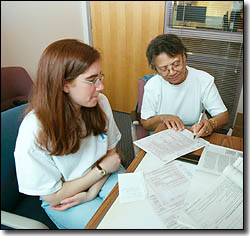As Tax Time Nears, Law Students Lend a Helping Hand

They walk through the door with handfuls or even shoe boxes crammed with crinkled letters, receipts, and tax documents from their pension plans, banks, the Social Security Administration, and the Internal Revenue Service. They rattle off questions and grievances one after another, looking for answers and a compassionate ear.
And they usually find both, when theyre sitting across the table from a Harvard Law School student working with the Volunteer Income Tax Assistance Program (VITA).
More than 25 years after the programs rather humble beginnings at the Law School, VITA now operates three assistance centers in the community during tax season, with about 50 volunteers helping hundreds of Cambridge-area senior citizens and low-income residents prepare and file their federal and state income tax returns.
The students, who undergo a five-hour tax training course, do not receive class credit for their work, but gain valuable real-world experience working one-on-one with people who may be most vulnerable to the arcane complexities of the tax code.
“It can be [intimidating] because the residents we have coming in for assistance often expect us to know all the tax law, and we dont know that,” according to VITA co-chairperson David Barrett 01. “We just have an organization that gets people together from the Law School who want to volunteer their time to help people file their tax returns, and we train them and provide all the logistical support to help this work.”
First-year law student David Coe pulls out his calculator, pencil, and eraser as he begins preparing returns during a recent afternoon at the North Cambridge Senior Center. Coes “office” is the multipurpose room within earshot of a blaring television set; his “desk” is a card table with folding chairs; his “clients” are senior citizens, often overwhelmed by the prospect of tiptoeing through the tax minefield on their own. None of it makes Coe flinch.
“[The volunteer work] is a great opportunity to help out in the community, and to try to feel youre more a part of the Cambridge area, rather than just being a three-year visitor,” he says. “I think a lot of us at the Law School frequently dont have much of an exposure to people in the area, so its nice to do that.”
At another table sits site coordinator Christina Finzel 02, who is attending to Mary Mahers 1040A as Maher discusses her husbands health problems while sorting through her financial records. “Working with the people may be the part that I enjoy the most,” Finzel says. “[They] have to open up for you to help them with their problems.”
The problems can range from not understanding the IRS instructions to miscalculating deductions to not having the correct forms, and thats where the volunteers budding expertise comes into play.
“Each week theres been at least one person who comes in with a problem weve never seen before, and thats part of the challenge,” Finzel explains. “The biggest challenge you feel is the pressure to get everything right. Youve got to be able to figure it out correctly . Its a lot of responsibility.”
According to Barrett, the training that the volunteers receive before working at a VITA site will not enable them to answer every tax question they field, but it does give them the knowledge and confidence to know where to turn for help if and when they need it. “When you have this basic level of training, you feel comfortable with the forms, and thats basically what troubles people we help,” Barrett says. “The IRS, although they generally have good instructions, theyre often very technically written, and if youre somewhat intimidated by it, you get lost.”
If it wasnt for VITA, Barrett believes, many of the taxpayers who receive assistance with their returns would “probably try to do it [themselves], and make mistakes, or be taken advantage of, or pay money that they shouldnt have to.”
There are times, Barrett explains, when student volunteers encounter a complicated return, one that their training hasnt prepared them for. When that happens, he says, the taxpayer is referred elsewhere for help. In the vast majority of cases, however, the volunteers are dealing with “mostly simple returns that are very easy for our volunteers to handle, and [the forms] tend not to be prone to mistakes, which is very important.” A typical consulting session lasts about 45 minutes, and covers a lot of ground, often resulting in good news.
“Looks like youll be getting money back again this year,” Coe tells Frances Dubnowski after calculating the figures on her returns. Moments later, sitting at the other table in the makeshift tax office in the North Cambridge Senior Center, Mary Maher learns that shell receive nearly $200 in refunds from the federal government. “Wonderful,” she says. “Ill take the check!”
The final VITA session for this year will be held on “Tax Day,” Saturday, April 15, at the main branch of the Cambridge Public Library. Barrett states the obvious: “I expect well be very busy on that day.” After that, he says, most of the volunteers wont want to see another tax return for a very long time.




